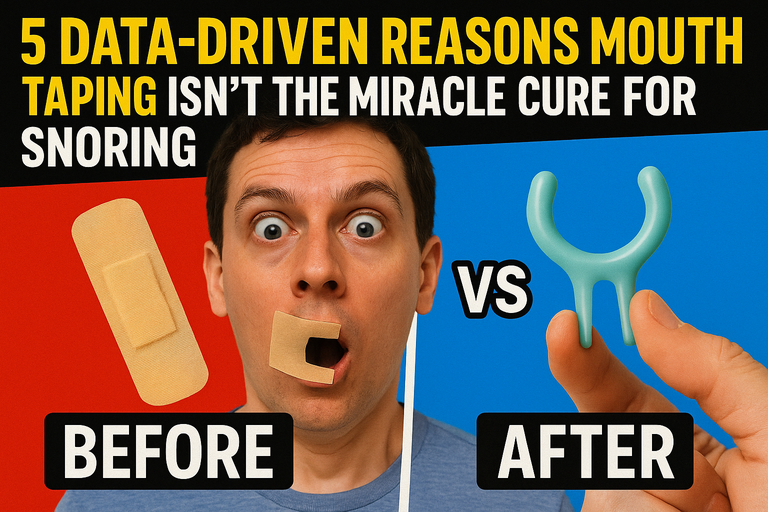
Ever wake up feeling groggy, your partner glaring at you like you’ve staged a chainsaw massacre in your sleep? You’re not alone. With social media awash in mouth taping hype, people everywhere are slapping tape on their lips, praying the snoring will stop. But is this viral fix backed by real science, or just another wellness fad? Buckle up—because we’re about to break down the data, bust some myths, and reveal an evidence-based alternative that just might save your next REM cycle.
The Hype: Why Is Everyone Suddenly Taping Their Mouths at Night?
Scroll TikTok or Instagram and you’ll find influencers touting mouth taping like it’s the holy grail of snore-free slumber. The idea? By keeping your lips sealed, you’re “forced” to breathe through your nose, supposedly minimizing snoring and boosting deep sleep.
But what does actual research say? And is mouth taping even safe? A recent explainer by MommyPotamus cuts to the chase: while there’s some anecdotal evidence, the data is patchy, and potential risks abound. Let’s unpack why.
1. The Data Gap: Mouth Taping Works for Some, But Not Most
While user testimonials make mouth taping sound miraculous, clinical studies are sorely lacking. According to a 2022 meta-analysis, less than 10% of published sleep studies even mention mouth taping as a significant intervention for snoring or sleep apnea. Most results are mixed—a handful of participants report improvement, but many see no change at all.
And here’s the kicker: most studies exclude people with nasal congestion, sinus issues, or allergies. That’s a huge swath of the population left out of the mouth taping conversation!
2. Safety Red Flags: The Not-So-Silent Risks
Mouth taping isn’t risk-free. While the MommyPotamus article highlights some benefits, it also points out the uncomfortable truth: taping your mouth can be dangerous if you have underlying breathing issues, sleep apnea, or even mild congestion. We’re talking about risks like:
- Restricted airflow (obviously!)
- Interrupted sleep if you struggle to breathe through your nose
- Potential skin irritation from adhesives
Worse still, a 2024 report in Sleep Medicine Reviews found that mouth taping can mask undiagnosed sleep apnea, leading to long-term cardiovascular risks. Yikes.
3. Comfort Factor: Will You Actually Stick With It?
Let’s be honest—how many people want to tape their lips shut every night? According to a 2023 survey from the National Sleep Foundation, comfort is the number one reason people abandon mouth taping within two weeks. That sticky, claustrophobic feeling gets old, fast.
4. The Biomechanics of Snoring: It’s Not Just About Your Lips
Here’s where data-driven analysis matters. Most snoring is caused by airway obstruction—think relaxed tongue and jaw muscles collapsing back during sleep, not just open lips. Effective snoring solutions target the source of the noise, not just the mouth opening.
Enter mandibular advancement devices (MADs) and tongue stabilizers. Multiple randomized controlled trials (RCTs) have shown that these devices can reduce snoring frequency and intensity by up to 60-80%, depending on the user. That’s light-years ahead of mouth taping’s mixed results.
5. A Science-Backed Alternative: Customizable Anti-Snoring Mouthpieces
So, what actually works? Data continues to support oral appliances that advance the jaw and stabilize the tongue. Take, for example, the Snorple Anti-Snoring Mouthpiece—an innovative hybrid that combines the best features of MADs and tongue stabilizers. Over 100,000 customers report positive outcomes, and unlike one-size-fits-all solutions, Snorple’s boil-and-bite process ensures a personalized fit.
Here’s what sets devices like Snorple apart:
- Customizable jaw advancement to keep airways open
- Hypoallergenic, latex-free materials for sensitive users
- Microwave prep (yep, no fiddling with boiling water!)
- Risk-free trial and fast delivery, reducing barriers to entry
Consumer reviews, plus independent sleep studies, consistently report significant snoring reduction and improved sleep quality with this type of appliance—without the safety risks of mouth taping.
Bottom Line: Ditch the Tape, Upgrade Your Toolkit
The numbers don’t lie—while mouth taping might work for a select few, it’s far from a universal snoring cure. If you want a solution grounded in real science (and far more comfortable), devices designed to target the actual root causes of snoring are your best bet.
Ready to move beyond DIY trends and level up your nights? Consider exploring anti-snoring mouthpieces backed by both research and positive user feedback. Your sleep—and your relationships—may just thank you.
Have you tried mouth taping, anti-snoring devices, or something else entirely? Did it help, or flop? Drop your experiences in the comments and join the QuietQuest community conversation!